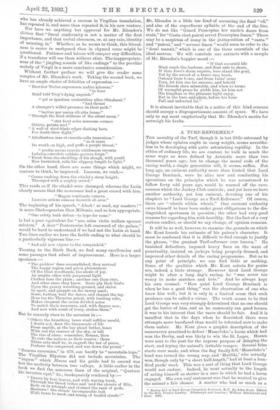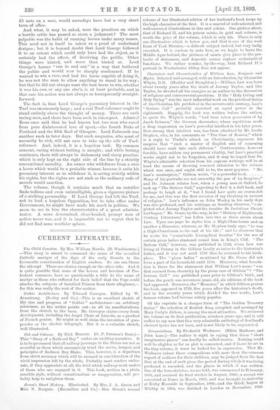A TURF-REFORMER.*
THE morality of the Turf, though it is but little esteemed by judges whose opinion ought to cam, weight, seems neverthe- less to be developing with quite astonishing rapidity. In the ethics of ordinary life, we are content to walk in much the same ways as were defined by Aristotle more than two thousand years ago ; but to change the moral code of the racing world, a single generation will, it seems, suffice. Not long ago, an eminent authority more than hinted that Lord George Bentinck, were he alive now and conducting his operations on the principles which he was accustomed to follow forty odd years ago, would be warned of the race- courses which the Jockey Club controls ; and yet here we have another authority, not less eminent, devoting one of his chapters to "Lord George as a Turf-Reformer." Of course, there are "wheels within wheels." One eminent authority owns himself to have been under great obligations to the dis- tinguished sportsman in question ; the other had very good reasons for regarding him with hostility. But the fact of a very curious conflict, or should we say change, of opinion remains.
It will be as well, however, to examine the grounds on which Mr. Kent founds his estimate of his patron's character. It must be confessed that it is difficult to find enough to justify the phrase, "the greatest Turf-reformer ever known." He banished defaulters, imposed heavy fines on the want of punctuality, insisted on jockeys being properly dressed, and improved other details of the racing programme. But as to any point of principle, we can find little or nothing. Some of the qualities which Mr. Kent selects for praise are, indeed, a little strange. However tired Lord George might be after a long day's racing, he "was never too weary to make matches and bets." And he always kept his own counsel. "How quiet Lord George Bentinck is when he has a good thing," was the observation of one who knew him well ; but it is only in a limited sense that such prudence can be called a virtue. The truth seems to be that Lord George was very strongly determined that no one should get the better of him, and as he commonly ran good horses, it was to his interest that the races should be fair. And, it is manifest that in the days when be flourished there were attempts more barefaced than would be tolerated now to make them unfair. Mr. Kent gives a graphic description of the manceuvres practised to defeat Mameluke,' a horse which had won the Derby, and was likely to win the St. Leger. Horses were sent to the post for the express purpose of delaying the start, and trying the animal's irritable temper. Several false starts were made, and when the flag finally fell, Mameluke's head was turned the wrong way, and who actually won, though only by "a short half-length," bad at least a hun- dred yards' start. This was a sort of thing that Lord George would not endure. Indeed, he went actually to the length of acting himself as starter in a race in which he had a horse engaged. His own waif statement was that he wanted to give the animal a fair chance. A starter who had so much as a * Racing Life of Lord George Cavendish Dentine's, M.P. By John Kent. Edited by the Hon. Francis Lawley. Edinburgh and London ; William Blaokwood and Bone. 1892.
£5 note on a race, would nowadays have but a very short term of office.
And what, it may be asked, were the practices on which a hostile critic has passed so stern a judgment? The most palpable was the habit of running horses under many names. This need not in itself be taken as a proof of underhand designs ; but it is beyond doubt that Lord George followed it to an extent which could only have had the object, as it certainly had the effect, of deceiving the public. Other things were hinted, and more than hinted at. Lord George's horses "ran in and out" in a way that bothered the public and would now be sharply condemned. If he wanted to win a race, and had the horse capable of doing it, he was not the man to allow anything to stand in its way ; but that he did not always want the best horse to win, whether it was his own or any one else's, is at least probable, and in that case his action was not always so transparently straight. forward.
The fact is, that Lord George's pecuniary interest in the Turf was enormously large ; and a real Turf-reformer ought to stand entirely above the thought of money. There are such racing-men, and there have been such in times past. Admiral Rona once said that he had known but two men who raced from pure disinterested love of sport,—the fourth Duke of Portland and the fifth Earl of Glasgow. Lord Falmouth was another such in later days. But such magnates, who must of necessity be rich, will net care to take up the role of Turf- reformer. And, indeed, it is a hopeless task. By common consent, racing without betting is naught ; and while betting continues, there will always be dishonesty and sharp practice, which is only kept on the right side of the line by a strictly conventional morality. An owner who withdraws from a race a horse which would be a probable winner, because it suits his pecuniary interest so to withdraw it, is acting strictly within his rights, but the rights are not such as the ordinary code of morals would sanction.
The volume, though it contains much that an outsider finds tedious and even unintelligible, gives a vigorous picture of a striking personality. If Lord George had left the Turf, not to lead a hopeless Opposition, but to take office under Government, he might have made his mark in politics. We seem to see in him the characteristics of a great adminis- trator. A more determined, clear-headed, prompt man of action never was, and it is impossible not to regret that be did not find some worthier sphere.







































 Previous page
Previous page